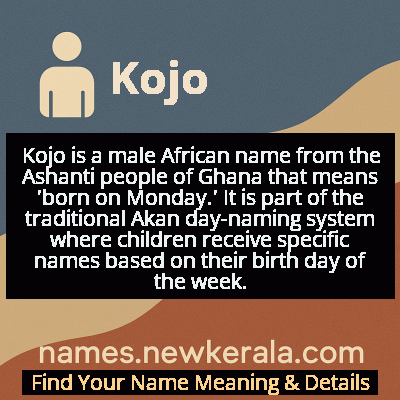Kojo Name Meaning & Details
Origin, Popularity, Numerology Analysis & Name Meaning of Kojo
Discover the origin, meaning, and cultural significance of the name KOJO. Delve into its historical roots and explore the lasting impact it has had on communities and traditions.
Name
Kojo
Gender
Male
Origin
African
Lucky Number
6
Meaning of the Name - Kojo
Kojo is a male African name from the Ashanti people of Ghana that means 'born on Monday.' It is part of the traditional Akan day-naming system where children receive specific names based on their birth day of the week.
Kojo - Complete Numerology Analysis
Your Numerology Number
Based on Pythagorean Numerology System
Ruling Planet
Venus
Positive Nature
Harmonious, responsible, caring, and artistic.
Negative Traits
Overly idealistic, superficial, possessive, or jealous.
Lucky Colours
Pink, turquoise.
Lucky Days
Friday.
Lucky Stones
Diamond, turquoise.
Harmony Numbers
2, 3, 9.
Best Suited Professions
Artists, musicians, teachers, healthcare workers.
What People Like About You
Warmth, nurturing nature, artistic flair.
Famous People Named Kojo
Kojo Annan
Businessman
Son of former UN Secretary-General Kofi Annan, involved in international business and philanthropy
Kojo Botsio
Politician
Ghanaian politician and one of the founding members of Ghana's Convention People's Party, served as Minister of Education and Foreign Minister
Kojo Antwi
Musician
Renowned Ghanaian highlife musician known as 'The Maestro' with numerous awards and international recognition
Kojo T. Vieta
Educator and Author
Ghanaian educator and writer known for his contributions to African literature and education reform
Name Variations & International Equivalents
Click on blue names to explore their detailed meanings. Gray names with will be available soon.
Cultural & Historical Significance
In Ashanti culture, Monday-born children (Kojo for males, Adwoa for females) are believed to possess particular qualities and are associated with peace, calmness, and diplomatic abilities. The name serves as an immediate identifier of one's birth day within the community and establishes a spiritual connection to the Akan calendar system. This tradition reinforces cultural identity and maintains ancestral connections, as the day-name system has been passed down through generations, creating a living link to Akan history and spiritual beliefs.
The cultural importance of Kojo extends beyond individual identity to community cohesion. In traditional Akan society, knowing someone's day-name immediately establishes a framework for social interaction and mutual understanding. This naming system represents a sophisticated cultural technology that has helped preserve Akan identity through colonialism, modernization, and globalization, making Kojo not just a personal identifier but a symbol of cultural resilience and continuity.
Extended Personality Analysis
Individuals named Kojo are traditionally associated with calm, diplomatic, and peaceful personalities. In Akan culture, Monday-born people are believed to possess a natural ability to mediate conflicts and bring harmony to challenging situations. They are often described as thoughtful, patient, and possessing excellent listening skills, making them well-suited for leadership roles that require consensus-building and careful decision-making.
These individuals are typically seen as reliable and trustworthy, with a strong sense of responsibility toward their community and family. Their peaceful nature doesn't indicate weakness but rather a strategic approach to life's challenges. Kojo's are often admired for their ability to maintain composure under pressure and their talent for finding middle ground in disputes. This personality profile, deeply embedded in Akan cultural wisdom, suggests that those named Kojo naturally embody the qualities of diplomacy, patience, and thoughtful action that their birth day represents.
Beyond the traditional associations, modern observations suggest that people named Kojo often develop a strong sense of cultural identity and pride. They tend to be bridge-builders between generations and cultures, valuing tradition while embracing progress. Their inherent calmness often makes them excellent in crisis situations, and they frequently become the stabilizing force in their social and professional circles. The name seems to carry an expectation of wisdom and level-headedness that many who bear it grow into throughout their lives.
Modern Usage & Popularity
In contemporary times, Kojo remains a popular and respected name throughout Ghana and among the African diaspora. While maintaining its traditional significance, the name has evolved to become a symbol of cultural pride and identity. Among Ghanaian communities worldwide, Kojo serves as a connection to ancestral heritage and cultural roots. The name continues to be commonly given to boys born on Mondays, preserving the traditional Akan naming system, but it has also gained popularity beyond strict adherence to birth days as parents choose it for its cultural significance and pleasant sound. In recent years, there's been a resurgence of interest in traditional African names, with Kojo benefiting from this cultural renaissance as younger generations seek to reclaim and celebrate their heritage. The name appears frequently in professional contexts across Africa and in diaspora communities, reflecting its transition from a purely traditional name to one that carries both cultural weight and modern relevance.
Symbolic & Spiritual Meanings
Symbolically, Kojo represents much more than just a day of birth—it embodies the principles of peace, new beginnings, and diplomatic resolution. In Akan symbolism, Monday is associated with the moon and calm waters, representing emotional depth, intuition, and the ability to navigate life's challenges with grace. The name carries the metaphorical weight of being a 'peacemaker' or 'bridge-builder' in community affairs. It symbolizes the quiet strength found in patience and the wisdom of choosing dialogue over conflict. As the first day of the traditional work week in many cultures, Kojo also symbolizes fresh starts, new opportunities, and the measured approach needed to build lasting foundations. The name serves as a living reminder that true strength often lies in peaceful resolution and thoughtful consideration rather than forceful action, making it a powerful symbolic representation of the Akan philosophical approach to life and community harmony.

